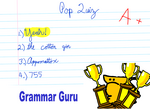User:Bill/Grammar Guide
From Homestar Runner Wiki
Below are some of the demons that I try to exorcise from the wiki.
This is a work in progress. You can request additions here.
affect vs. effect — In most cases, affect is a verb and effect is a noun.
- The effect of the moonbeams on Marzipan's golden hair was stunningly coincidental.
- Maripan's moonlit hair affected Homestar in a predictably unpredictable manner.
(Note that effect can also be a verb meaning "bring about", and affect can also be a noun referring to emotion apart from thought — but if you know all that, you probably already know enough not to misuse affect and effect.)
alot — This should be two words. Always.
ensure vs. insure — Use insure only if you're talking about insurance. If you just want to "make sure of" something, use ensure.
everyday — Many people mistakenly type this as one word when it's supposed to be two. As a single word, it is an adjective, as in "let's use the everyday china". If you're not using it as an adjective, chances are you need to make it two words. One diagnostic trick is to replace "day" with "week" and see if what you wrote still makes sense.
- Every day is a picnic in Strong Badia.
- Remember to brush your teeth and kick your The Cheat every day.
- Marzipan is not your everyday broomstick-woman.
is comprised of — Comprise is a synonym for include, but some people misuse it as a synonym for compose (the most common offense being "is comprised of"). A book comprises the chapters. The chapters do not "comprise" the book, and the book is not "comprised of" its chapters. If you want that sentence structure, use is composed of, is made of, includes, etc.
its vs. it's — Anybody who still isn't sure about this one should watch local news again and memorize "Strong Bad's Rhythm 'n' Grammar":
- Ohhhhh... If you want it to be possessive,
It's just "I-T-S."
But if it's supposed to be a contraction,
Then it's "I-T-apostrophe-S,"
Scalawag.
If you insist on using it's as a possessive, then please have the decency to also use her's, him's, you's, me's, them's, and us's.
long term and short term — These phrases should be hyphenated when used as unit modifiers (adjectives), non-hyphenated otherwise.
- Nobody knows the long-term effects of melonade.
- The short-term environmental impact of the King's latest binge is significant, but in the long term it will be mitigated by the Poopsmith.
only (dangling modifier) — A modifying word should be as close as possible to the thing it modifies. Usually, the "only" is occurring too early in the sentence.
- I only bought her the present because I wanted to say I was sorry. (incorrect)
- I bought her the present only because I wanted to say I was sorry. (correct)
The word only isn't restricting the number of things you bought; it is restricting the reason for the purchase.
serial comma — Someday I will write the argument for why serial commas are the way to go, and those of you with a newspaper background will tar and feather me.
should of — This is a common corruption of should've or should have, and comes from what Bernstein calls "a bad ear". Homestar provides a deliberate example of this in dullard.
somewhat of a — This phrase is never correct; instead use "something of a", or recast and use "a somewhat".
- Fightgar took a somewhat dangerous route to the base.
- That underbite man seems somewhat retarded.
- I've heard that Strong Bad is something of a showoff.
'til and 'till — Use till. Forget what I wrote before, and use till. I'll write more about this later.
try and — Make that "try to".
weather — If you mean the conjunction whether, then type "whether".
- Whether or not the weather was cooperative, they met at The Stick every day. A lot.
which vs. that — I need to remember to write something here about restrictive and nonrestrictive clauses.
your vs. you're — Don't type "your" when you mean you are.
- You're not going to eat your own mustache, are you?

